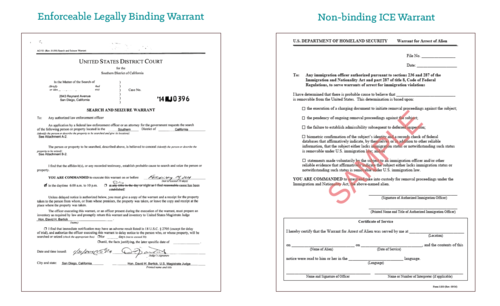Under federal law, certain Immigration and Customs Enforcement Officers cannot execute search warrants. They also cannot enter your residence to serve an arrest warrant. So what do you do if ICE is outside your door? To understand your options, you need to know a little history about the agency.
The Department of Homeland Security
The Department of Homeland Security (“DHS”) is a relatively new branch of government, formed in 2003 in the aftermath of the 9/11 attacks. It ended up being a mishmash of various agencies that had been thrown together, some with no prior connection. The Immigration and Naturalization Service (“INS”) was previously the sole agency responsible for immigration and enforcement. It was housed under the Department of Justice, but was split up, sent over to the newly created DHS, and reformed under U.S. Citizenship and Immigration Services (“USCIS”) and Immigration and Customs Enforcement (“ICE”). USCIS handles the various petitions and applications filed to gain an immigration benefit, such as applications for permanent residency and citizenship. ICE handles 2 major tasks, investigating criminal and terrorist activity, and enforcing the removal of immigrants who are in immigration court or who have been ordered deported.
2 Branches of ICE
ICE can be broken down into 2 branches, Homeland Security Investigations (“HSI”) and the Enforcement and Removal Office (“ERO”). ERO is responsible for detaining migrants, placing them in deportation proceedings, and physically removing them from the country. HSI’s role differs greatly from ERO. HSI agents investigate criminal organizations that exploit the U.S.’s travel, trade, financial, and immigration systems. They fight terrorism, cybercrime, human smuggling, financial crimes, narcotics and weapons smuggling, and transnational gang activity. They simply aren’t involved in removing non-citizens ordered deported by an immigration judge.
Division among ICE
HSI was formed from investigators taken from the Department of the Treasury and relocated to ICE. This was to the great disappointment of Treasury investigators, some of whom still refer to the “unfortunate events” when DHS was created. HSI agents have had increasing difficulty performing their jobs, such as working with local law enforcement and with the community due to the stigma of being associated with ICE and the work that is performed by ERO. This has led recently to 19 high-profile agents signing a letter asking Homeland Security head Kirstjen Nielson to break up the agency to allow HSI agents to do their jobs.
There is also an internal division of prestige between HSI and ERO agents. Working for HSI brings the rank of “special agent,” and what is known under federal guidlines as having 1811 classification. This sets them on the same level as FBI agents. ERO agents on the other hand have only 1801 classification. This typically involves a less favorable pay scale, and limited powers. ERO officers for example are not allowed to execute search warrants.
ICE ERO Agents at Your Home
ICE agents who appear at your home to serve an ICE warrant for removal proceedings or to execute an Order of Removal are ERO agents. Since these agents do not have the authority to execute a search or execute the removal warrant, their powers are severely limited. They cannot enter your home without permission. If they knock on the door and no one is home, they have to wait. If the person they’re looking for is home, he or she has the right to refrain from letting officers inside. If that happens, the officers have no other recourse that to sit outside and wait. They may lie or use other tactics to entice you to let them in, but you do not have to give consent. If local police try to assist ICE in only executing the ICE warrant, they may be liable for violating your 4th Amendment rights against unlawful searches and seizures.
Who is knocking on the door?
If any law enforcement knocks on your door there are tips and procedures that you should follow. You will want to make sure you understand what it is they are trying to serve you with. If it is an ICE warrant, you have the right to say no and stay inside. However, it is often hard to tell from apperance whether the agents outside are local police, state investigators, ICE, U.S. Marshals, or any other law enforcement. Several agencies, including ICE, are allowed under federal regulations to wear clothing that simply says “Police.” Federal agents with actual authority to execute warrants may be looking to arrest you for federal court proceedings, brought in U.S. District Court, and not immigration courts. These agents will have the ability to execute the warrant with or without your consent. Below are examples of types of warrants that may be presented to you.

Removal Proceedings
If ICE agents are trying to serve you with a charging document (called a Notice to Appear) to begin removal proceedings against you, or if you have an outstanding Order of Removal and agents are attempting to physically deport you, give the experienced immigration attorneys at Maniatis Law PLLC a call at our office to discuss your options. Don’t wait! Hablamos Español.
